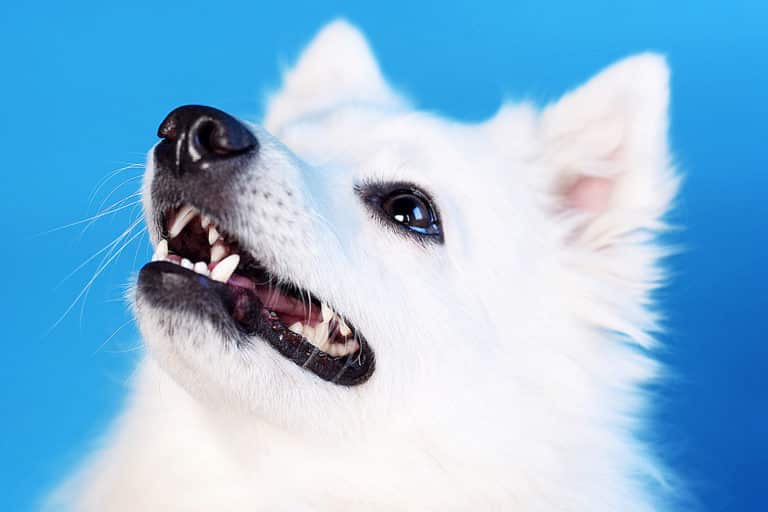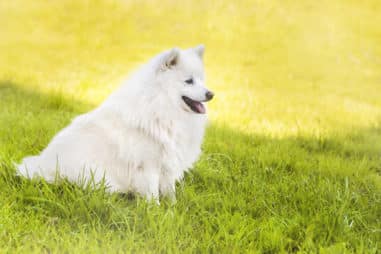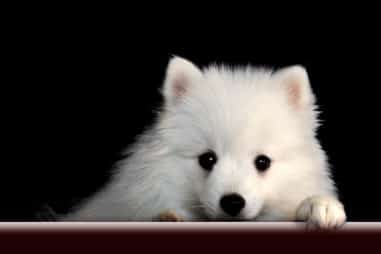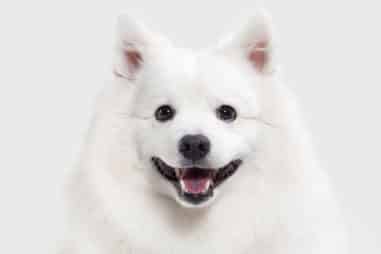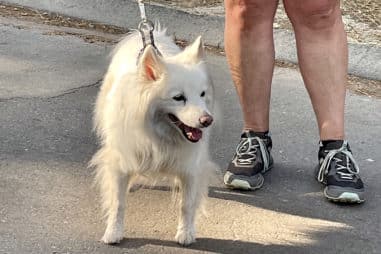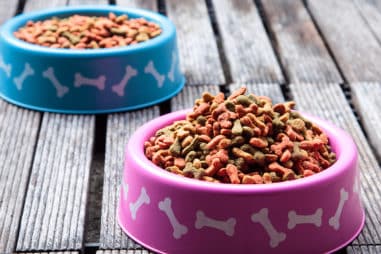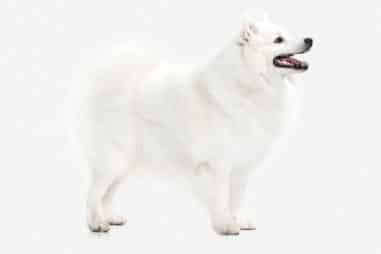The Spitz canine family is recognized as having highly energetic dogs, however will tire out in no time if you will subject to more than an hour of intense outdoor activity like exercise or hiking.
Are Japanese Spitzes Very Vocal?
The answer is a big, resounding “YES”. Japanese Spitz dogs are very vocal canines. Their small stature makes you think they have a tiny bark, but you are in for some surprise by how loud their barking can get, making them great watchdogs! Certainly not the best choice if you are looking for a quiet breed. These dogs are known for barking and howling a lot.
Dogs can alter their barks based on their emotional state and what they’re trying to communicate. There could be different meanings for the same bark and the same bark could have different meanings. Among the major reasons dogs bark are protection, alarm, fear, boredom, when they seek attention, greeting, separation anxiety, and compulsive barking.
They can learn how to refrain from barking but you need to tell them when and how to. Food and praise, along with positive reinforcement, can help them learn quite quickly, but don’t even think about growling at them. If you do so, as puppies they will interpret that as a type of fun game to play.
The bark of a Japanese Spitz isn’t a huge deal, but there are other factors to take into account. They’re also rapid talkers who can learn how to perform a variety of feats with relative ease. It is not challenging to teach them how to speak or sit nicely.
Are Japanese Spitz Barkers?
The Japanese Spitz dog can be an inveterate barker if you allow them to believe they are in charge. It is critical to keep an eye out for signals that your Japanese Spitz is barking, as you cannot prohibit the behavior entirely.
However, with adequate training and instruction, you can keep your dog from forming unpleasant barking behaviors even at a young age. If you haven’t previously done so, your dog may need to be barked out of the habit in some situations.
Canines, being what they are, will always bark; it is a natural trait in them. A Japanese Spitz bark will be surprisingly loud at strangers who enter their territory. They will tone it down, though, if you reassure them that the presence of a stranger, a guest, visitor, or anyone they don’t necessarily know is okay.
Why Do Japanese Spitz Dogs Bark So Much?
Compared to many other canine groups, the Japanese Spitz breed is considered an average barker. They tend to bark the most only when they feel the need arises. You may see this coming through while they are engaged in a play or to let you know that someone is at your doorstep. Basically, we classify them not as habitual barking dogs.
Japanese Spitzes are naturally inquisitive by nature. This makes them prone to excessive barking, which can be construed in a variety of ways depending on the situation. The following are some of the reasons why a Japanese Spitz dog would go into a barking spree:
- A Japanese Spitz barks when someone or something breaches his or her territory or favorite hangout spot. If they perceive something as an imminent danger, their barking usually gets louder.
- They bark out of fright and to let their owners know they’ve noticed something unusual.
- Japanese Spitzes are pack animals, much like any other pets. They grow upset or get bored easily when left alone for long periods of time, which can set the stage for them to have depressed barking.
- Japanese Spitzes bark a lot when they’re having fun or greeting new people or other dogs in the house. This type of bark is non-threatening especially when accompanied by hopping and tail wags. Besides, it’s also quite upbeat.
- Dogs of the Japanese Spitz breed are well-known for barking when they demand attention, such as when they want to go on walks outside the home or when trying to engage their owners into playing with them like fetch.
- Japanese Spitzes with acute separation anxiety bark non stop when left alone at home. Additionally, they may engage in destructive behaviors such as digging, destroying, or pacing, or even show signs of despair.
How Do You Train a Spitz Not to Bark?
Since there is no single root cause for excessive barking, there is no “one size fits all” method of treating it. If you believe that your Japanese Spitz dog is barking excessively at almost every turn, finding a way to dampen it somehow is a breather.
We have below a number of basic management solutions that you can quickly adopt and a few training ideas that require practice on a continuous basis.
- Remove whatever it is that motivates your dog to bark: It is easier said than done, but you need to identify the reason why your Japanese Spitz dog barks excessively and, if possible, remove it.
- Until your Japanese Spitz dog stops barking, don’t pay attention to their woofing attempts. Excessive barking is sometimes one way they seek your attention. When they are finally calm, that is the time you can give them a treat as a reward.
- Maintain your Japanese Spitz’s tiredness: Make sure your Japanese Spitz gets enough physical and mental exercise on a daily basis. If your pooch is preoccupied, looking forward to a routine of physical and mental activities, he is far less inclined to bark out of restlessness or irritation.
- This management solution is highly effective for alarm and territorial barkers. If your dog reacts to something they see outside, simply shift their vantage point.For example, during high-traffic hours, close the blinds or apply a temporary stick-on opaque privacy film. Place the window film a few inches above your dog’s line of sight, then gradually drop it down inch by inch over several weeks before totally removing it.
- Boredom and separation anxiety barkers may enjoy playing with hard rubber toys that dispense rewards. Treats dispensing toys might also help attention-seeking barkers who react when you’re on the phone or at the computer.
- The following management strategy is effective for fear and separation distress barkers: When dogs bark due to stress, plug-in diffusers that simulate the “calming hormones” emitted by female dogs can be used to help calm the dogs down. While you may not notice a significant change in behavior right away, keep in mind that plug-in therapies are not as potent as prescription strength diffusers. But it can help make a frightening scenario for a dog seem more manageable for them.
How to Stop Your Japanese Spitz Dog from Barking at Your Neighbor’s Dog?
Numerous factors may play a role in your Japanese Spitz barking at other dogs. This includes, but is not limited to, playfulness, fear, rage, enthusiasm, territorial threats, and under socialisation.
While any of these causes could contribute to your Japanese Spitz barking at other dogs, the possible ways to remedy the situation are rather simple.
To prevent your Japanese Spitz from barking at other dogs, the most efficient way is to progressively socialize them. Introduce them to other pets gradually and safely, rewarding them for appropriate behavior. Doing so will help them realize they are safe and not in harm’s way in the company of other dogs.
Once you’ve improved this aspect of their being, their socialization abilities, they’ll understand how to interact with other animals and thus refrain from their tendency to bark at them.
Are Japanese Spitz Yappy?
Many people have unwittingly generalized that small breed dogs, including the Japanese Spitz, are a yappy, annoying type of dog. Small breed dogs don’t just yap for any reason, according to the latest research. To put it another way, it’s not something they’re predisposed to. Most of the time, dog owners bear the brunt of the blame in the majority of situations involving undesirable or problematic canine behavior.
A lack of obedience training, a lack of shared activities with their owners, and punishment are three factors that contribute to excessive barking in dogs, according to canine behaviorists.
Obedience or agility training will help dogs of all sizes less likely to become excessively excited when the doorbell rings or when they see other dogs or meet strangers.
Barking dog owners are notoriously inconsistent when it comes to educating their pets; they’ll halt the behavior one day and ignore it the next. Owners of little dogs have a tougher time controlling their pets than owners of large dogs, probably because larger canines pose a greater threat to others and need more effort from their owners.
Dog owners who spend time playing with their dogs, whether it’s fetch, tug-of-war, or running, report that their dogs are more peaceful as a result. Because of their size, smaller dogs often miss out on common activities.
Yelling out loud or scolding your dog will do him no good when he is barking hard and strong. Also, don’t use physical punishment, like grabbing the dog or tugging the leash. Such measures will only intensify his nervousness or excitement, thus causing them to bark even more.
Do Japanese Spitz Howl?
The Japanese Spitz canine breed can howl, and howling is one of the innate natures of dogs in general. It is a part of their genetic makeup. Simply joining in the chorus might be an indication of ancestral fervor on their part.
Your dog’s howling could be an autonomic response, harkening back to their common ancestors with wolves, and therefore harmless. Domestic dogs, like howling wolves, have the ability to set off a complete event of sounds with a single howl of their own.
The second another dog hears it, all the other dogs in the area will join in, and the contagion can span a large area! It’s ultimately a bonding exercise that’s good for dogs and is indicative of their species’ group mentality.
Why Do Japanese Spitz Howl?
Dogs, including Japanese Spitz dogs, howl to communicate with their humans, and the rest of the canine world. It allows them to attract their human’s attention, initiate contact with other canines, or signal their presence in a crowd.
Howling is instinctive in dogs in general and can be triggered by a range of things, including separation anxiety, stress, senility, physical pain, issues with their diet, boredom, hearing other dogs howling or an acute medical condition.
- Separation anxiety: Your Japanese Spitz dog’s howling may have been due to separation anxiety. They are saddest if their owner is not around for a long time, or if their humans bar them from sleeping with them on their beds. Their crying due to separation anxiety could linger for many days, or even until their human owner returns.
- Hears other dogs howling: Dogs frequently howl in response to the howling of other dogs in their neighborhood. It may howl to inform other dogs of its whereabouts or to warn them not to encroach its area or territory.
- Boredom: Dogs are supposed to be active on a daily basis. When dogs are not physically active, it can make them behave in an odd way, which may explain why they have a tendency to wail and howl at night.
- Age/Senility: Much like humans, as dogs age, their joints get stiff, which may explain why they howl at night. This is likely to happen if your dog is at its prime and has been exhibiting signs of discomfort throughout the day and night. Under such scenarios, it is prudent to consult your veterinarian to ease up his physical pain.
Some dogs scream in response to high-pitched sounds, such as those made by emergency sirens or musical instruments. The excessive howling of dogs like Japanese Spitzes may indicate that they are in great distress.
Do Japanese Spitz Shed a Lot?
Despite being heavy shedders, Japanese Spitz do not shed continuously. Almost any animal with hair will shed its coat at one point in time, and dogs and Japanese Spitzes are not an exemption to this. However, the timing of the shedding and the amount of fur that will fall off their bodies will vary greatly upon their breed.
During the course of the year, the undercoat of a Japanese Spitz dog is practically shed all at once. Despite this, there is a difference in the amount of shedding between male and female Spitz. The male sheds his coat once a year while the female sheds twice a year, usually during the spring and fall change of seasons.
How Much Do Japanese Spitz Shed?
This breed of dog will not shed its coat at such a very alarming rate. On a scale of 5 for the breed of dogs that shed their fur the most, Japanese Spitz dogs are given a score of 3 by top pet experts. You will notice excessive amounts of shedding in Japanese Spitzes only during their shedding or molting period.
Consider seeing your veterinarian for counseling or assistance if your pet’s undercoat is shedding in an unusual way or the amount of fur shed is copious during their molting phase.
You should also consult a veterinarian if your Spitz’s coat seems unusually thin and dull, as this could sometimes indicate an issue with their health. Dogs with unusual looking coats can serve as a visual clue that they need a visit to a vet clinic.
These symptoms, for the most part, aren’t that serious. They can simply be related to a poor diet. A far more serious health problem could be a possibility too, such as hypothyroidism. As soon as the underlying cause is addressed, your dog’s coat will return to normal.
How Frequently Do Japanese Spitz Shed?
The undercoat of a Japanese Spitz dog is completely shed off in a period of 2 to 3 weeks when they “blow” their coat. This is a natural biological process that occurs in the canine world when their coat is shed off to help in regulating body temperature, technically referred to as “moulting”.
Now, moulting occurs twice a year in dogs and Japanese Spitzes. During May, the biggest shedding will take place when the winter coat is expected to fall off. The thicker hair that grows after an autumn moult is most pronounced among longhaired dogs, but this can be significantly impacted by temperature and light exposure.
When Do Japanese Spitz Shed Their Fur?
The majority of shedding of coats in dogs usually happens in the spring and fall for breeds that shed on a seasonal basis. In preparation for the warmer season, your dog’s coat will grow lighter in the spring. Similarly, in time for the fall, when your dog’s body prepares itself for the winter, you will notice a change in their coats as well as an increase in the amount of shedding.
The shedding, lasting for one to two weeks, is readily removed with a simple brushing. You will not experience any hair loss between shedding periods, so you will only need to brush them once a day for about two weeks out of the year to assist in removing the dead hair.
Alternatively, you can take your Japanese Spitz dog to a professional groomer twice during their shedding period so they can efficiently remove your dog’s dead hair for you. As you see, it can be a pain to clean up after your dog while he sheds his coat. So a professional groomer is going to be a big help in that regard.
Is It Normal for Japanese Spitz to Shed a Lot?
Spitzes, even those with double coats, lose very little hair throughout the year. Expect to see lots of shed hair around the house when they are going through their big marathon shed.
If your dog appears to shed an undercoat more than twice a year, or if his hair appears thin and drab, a visit to the vet would be necessary. When a dog’s coat is unhealthy, it is best to assume that something is amiss with his health. It might be anything as simple as poor food quality or something more pronounced like hypothyroidism.
If you think the shedding is abnormal, go to a veterinarian to rule out medical problems. Talk with your veterinarian to determine if dietary changes can be made. Consider high-quality meals that contain 100% protein, fresh meats, and healthy fats such as fish, sunflower, and coconut oil. Your pooch may also benefit from taking omega-3 supplements.
These are the telltale signs that your Japanese Spitz dog might be shedding too much of its coat:
- Irritation of the skin (redness, pimples, rashes, and/or scabs)
- Bald patches
- The coat is severely thinning.
- Sores that are open.
- Excessive itching or scratching of the face.
- Licking that is more than usual
Why Is My Japanese Spitz Shedding Too Much?
If your Japanese Spitz dog seems to shed excessive amounts of hair, it is important to remember that this breed is naturally predisposed to do so. Some dogs shed all year round, especially if they spend most of their time indoors. If you do not know what’s normal, how can you know?
Here are some of the most probable reasons why your Japanese Spitz dog is shedding too much:
- Natural function: As a general rule, if your dog sheds evenly throughout his body and doesn’t leave any bald spots, it’s healthy and normal. When do dogs shed the most? In the spring, most dog breeds shed their overcoats to prepare for the warmer weather season. Before the fall commences, they develop a new undercoat to protect them from the cold.
- In response to parasites and fungi: Your dog may have fleas, ticks, or mites on his coat or you may observe irritation on his skin – he may lick, scratch, or bite that area in order to relieve himself of the discomfort. The hair loss occurs in circular or randomly distributed patterns if he has fungi-induced ringworm, but only in areas such as ears, stomach, chest, and eyes if he has parasite-induced hair loss. Most often, you can keep such pests at bay using topical treatments such as antifungal shampoos.
- In response to allergies: Like humans, dogs can acquire allergies to many stimuli. Hair loss in your dog might be due to an unsuitable medicine. Pollen, mold, fleas, and dust mites are typical environmental triggers, whereas food allergies include beef, dairy, wheat, poultry, maize, and soy.
- In response to pregnancy: If your Japanese Spitz dog is female and is going through excessive shedding of her coat, it could be brought about by pregnancy. If this is the case, her body could be running low in calcium and minerals necessary for a healthy coat. She may shed excessively, shed during the wrong season, and/or shed in the days following delivery.
- In response to a grave illness: Regrettably, a variety of illnesses can cause your dog to begin shedding his coat in copious quantities. Immunological disorders, cancer, or liver, thyroid, adrenal, or a kidney condition such as Cushing’s disease are also possibilities.
How Do You Stop Japanese Spitz From Shedding?
In the absence of any serious underlying reasons, the following are a few simple actions to take to treat your Japanese Spitz’s excessive hair loss issue and assist in maintaining a healthy coat.
If you suspect abnormal shedding in your Japanese Spitz, you may visit the nearest vet clinic to rule out a medical condition.
Think about how you can improve your Japanese Spitz’s diet by changing its food. Or switch your dog’s diet to something healthy with high protein content, fresh meat, and oils such as fish, sunflower, or coconut. Consider a supplement containing omega-3 fatty acids as well.
Dogs with longer coats and/or undercoats may require the use of a slicker brush, coat rake, or shedding equipment. These tools can get beyond the outer coat and grab the silky hairs beneath without hurting the dog’s skin. Brush in both directions to loosen hairs before pulling them up and away in the direction of growth.
In order to prevent your dog from scratching and losing fur, some veterinarians advise using a shedding shampoo to maintain his skin soft and moisturized.
Certain dogs withstand, even love, being vacuumed on a regular basis to remove extra hair. Vacuum attachments specifically designed for this purpose can be found on sale online.
Do Japanese Spitz Smell?
The Japanese Spitz dog, despite the volume of their coat and their gorgeous white appearance, happen to have very modest maintenance requirements. It works to their advantage that their fur actually repels dust, filth and grime. Hence, these dogs don’t require frequent washing or bathing. Unlike with other breeds, it is not an absolute must for a Japanese Spitz because they do not have that distinct doggy smell or odor.
Over-bathing this canine breed will do more to them than good because it tends to remove vital oils from their skin, making it prone to dryness. Prolonged skin dryness will lay the foundation for a wide spectrum of issues on their skin.
Are Japanese Spitzes Aggressive?
The Japanese Spitz, in contrast to the majority of Spitz breeds, is rarely aggressive. However, they have a tendency to act aloof or bark at strangers as well as other pets. The majority of this behavior occurs as a result of the breed not being properly socialized from a very early age.
In spite of the fact that they may have a certain amount of aggression toward new people at first, they can get used to them quite easily, especially if they are exposed to them repeatedly.
The Japanese Spitz’s territorial nature should be kept in mind while choosing a home for them. They perform best when they reside on a property with a fence that divides them from the surrounding properties. In addition, Japanese Spitz dogs are usually good with other dogs in the house. Yes, by nature, they are not aggressive.
Why Is My Japanese Spitz Aggressive?
If your Japanese Spitz dog is aggressive to some extent, know that this is in complete contrast to one of their fundamental traits, friendly and comely nature. If they have some aggression in them, it is possible that they were nurtured in an environment where aggression is a highlighting character. Therefore, you might need to go the extra mile to know something, anything about them with respect to where they came from – their breeder.
If you were able to do so, then you will know the proper course of action to take. While professional behavioral training is an option to remedy aggressive dogs, we suggest that you consider that only in extreme cases wherein you find them uncontrollable. Or if you think that your dog’s aggression would lead to attacking or biting people or other pets.
Does the Japanese Spitz Bite?
It is never the intention of any dog to bite anyone. They don’t do it on purpose. Especially in the case of a Japanese Spitz dog. This sweet breed of a dog who has earned a good reputation for being a friendly family dog will not be aggressive on its own for no reason.
Biting is a natural tendency of any dog, regardless of breed, and this can be seen even in domesticated canines, no matter how friendly they are to people. When dogs bite, remember there is always a trigger factor somewhere. It is likely that they felt threatened, or they perceived they were in imminent danger.
Biting is a dog’s major defense mechanism against possible threats they perceive, regardless if it is real or not. This is the major reason why it is imperative for any dog owner to have a good level of awareness of what can possibly provoke their dog to bite other people or other pets in their house.
Why Do Japanese Spitz Bite?
When a dog or a Japanese Spitz dog attacks or bites someone, this usually does not happen at random or just out of nowhere, although there are instances when it seems that way.
There are a handful of reasons why a dog thinks that biting someone is the most appropriate reaction they can give in a particular situation, ranging from minor nicks to major injuries that need medical attention.
Unfortunately, the indicators that an imminent bite is about to occur are usually ignored by people. Before the actual biting happens, most dogs would snarl, snap at the air to express their dissatisfaction at what is being done to them, or bark repeatedly at the person.
Here are some of the underlying reasons why some dogs, like the Japanese Spitzes, lose control of themselves when provoked, then attack and bite someone.
- Fear: Most dog aggression is founded in fear. A dog may be afraid of something or someone approaching them. When a dog’s fear comes too close, they might get overwhelmed or “over threshold” and bite. Fearful dogs bite to establish distance from anything or anyone they are afraid of.
- Startled: Dogs can bite if startled, especially if they have been fast asleep and have been interrupted abruptly. A startled dog may be confused about where they are and what is going on, and thus may bite in confusion. Both humans and dogs may be surprised to a certain degree by these bites. It is a behavior commonly observed in senior dogs who may have reduced vision or impaired hearing, causing them to easily get disoriented if jolted awake.
- Protecting/Guardian: A dog may bite you if it wants to keep something it doesn’t want to share, such as food, toys, or chews. Dogs bite to protect whatever items that are so valuable to them. Dogs, regardless of breed, may bite if they believe their space or territory is at stake or is being invaded. They also tend to bite anyone whom they think is assaulting their human (regardless of whether that danger is real or not).
- Frustration: Dogs, including Japanese Spitzes, can bite anyone when they are overwhelmed. When dogs feel stuck in undesirable circumstances, they may bite. When an owner or leash prevents a dog from reaching what they desire, frustration can ensue. Bite redirection happens when dogs attack objects or people holding them back.
- Play: When dogs are playing, they frequently bite, which sometimes people misinterpreted as a form of their aggression. But in reality it is not. It is natural for dogs to indulge in light biting or mouthing during playtime with other dogs. They use this form of interaction to play with each other and, of course, with their toys. Often, playful biting is accompanied by wagging of their tails in a cheerful, sprightly mood.
Are Japanese Spitz Dangerous?
The Japanese Spitz is not a dangerous breed at all. In fact, there is no such thing as a dangerous breed of dog. Such prejudice is so unfair to the canine family. Anyone who labels a particular breed of dog as something dangerous need proper education in canine behavior and temperament.
The Japanese Spitz is a loving, loyal, and inquisitive dog. They usually get along very well with fellow dogs in their house and are even willing to share their home with cats and other small animals. They are among the most suitable dog companions for people from different walks of life.
They are never fussy with their space, and they are happiest when they are with their human family because they have this innate, insatiable need to belong. And they can only find that in the company of a human family. With some of the positive characteristics of a Japanese Spitz described above, them becoming a dangerous dog breed is absolutely unthinkable. Because not even a single hair on their body is mean.

